Understanding INFJ Intuition
“I have striven not to laugh at human actions, not to weep at them, nor to hate them, but to understand them.”
– Baruch Spinoza, INFJ
INFJs live in a world of quiet introspection and imagination. They have an uncanny ability to see through people, situations, and words to find hidden meanings, motives, and outcomes. They care very little about how something appears to be on the surface but instead try to peer deeply into what something means, what its essence or core truth is.
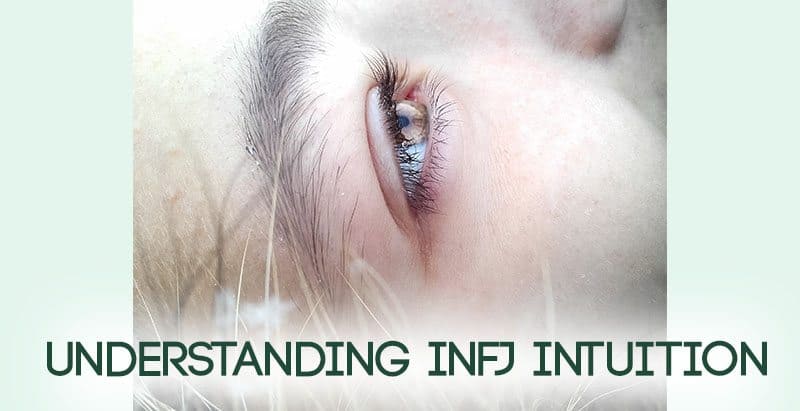
INFJs are known for their strong insights about people and situations. They get these insights through the use of their dominant cognitive function, Introverted Intuition. They also are extremely aware of people’s emotions and moods. This combination of skills means that an INFJ can easily pick up on even the slightest mood changes and inconsistencies in behavior and then intuitively grasp what may be bothering a person. They are constantly aware of other people’s body language, tone of voice, and facial expressions to pick up on hidden meanings, motives, or feelings. This can give them an aura of seeing “through” someone, and it helps them to deeply empathize with and understand others. It also makes them excellent counselors, therapists, and social workers.
Not sure what your personality type is? Take our new personality questionnaire here. Or you can take the official MBTI® here.
This article contains affiliate links. I only recommend products I truly believe in.
Are INFJs “Psychic”?
As far as being psychic, the INFJ can’t read minds or literally see into someone’s future. They rely on their advanced intuition to scan through loads of sensory information and grasp patterns and connections that give them clues about what may happen in the future. They are much better at determining future outcomes than many other types, but it isn’t because of any magical ability, it’s simply the way the INFJs mind is programmed. This is where we get into really understanding INFJ Introverted Intuition.
What Is Introverted Intuition?
Introverted Intuition (Ni) is the most advanced and utilized function of the INFJ. This is what I like to call their “superpower” function. Ni gives them the ability to find meanings and connections behind things and then to connect the dots of those clues into a future-oriented response. Why is this here? What does this mean? What does this tell me about the future? These questions pervade the INFJ’s existence. INFJs have a tendency to always look forward and to always decipher what current information can tell them about a future outcome.
One of the best ways to understand Introverted Intuition is to compare it to its opposite; Introverted Sensing. While Introverted Sensing is focused primarily on storing personal impressions from concrete data and learning from it, Introverted Intuition is focused on connecting impressions or patterns from current experience and unconscious data to form a forecast of what is yet to come. This is why INFJs, INTJs, ENFJs, and ENTJs will focus a lot on future ideas and outcomes and ISTJs, ISFJs, ESFJs, and ESTJs will hold on more to the past and teachers from the past. Ni users will focus more on theories and impressions and Si users will focus more on literal details and facts.
How Do INFJs Get Their Intuitive “Hunches”?
INFJs combine Introverted Intuition (Ni) with Extraverted Sensing (Se). Extraverted Sensing gathers copious amounts of sensory information from the external world that is then stored in a web of information inside the INFJ’s mind. Using Introverted Intuition, the INFJ scans through all of the information, connecting dots, seeing which patterns manifest themselves, and interpreting all the clues to formulate a projection of what may happen further on down the road. The Extraverted Feeling (Fe) of the INFJ also helps the INFJ to determine any underlying emotions and feelings that a person may be experiencing to project an accurate insight into what someone is going through or how they may emotionally respond to something.
Much of this intuitive process is done in a nearly unconscious way by the INFJ. This is why many of their revelations may seem to appear “out of the blue.” They themselves may not even realize in the moment how they received these insights, but after careful consideration, they are able to understand how the different clues led them to their insight.
Dario Nardi explains it well in his book The Neuroscience of Personality
“The Ni types often show a whole-brain, zen-like pattern. This pattern occurs when all regions of the neocortex are in synch and dominated by brain waves that are medium-low frequency and very high-amplitude….What is this zen state like? When presented with a problem, the Ni types seek to harness all neocortex regions in order to “realize” an answer. Imagine a troop of blind men trying to identify a secret object by touch. One man feels a trunk and says, “tree”; another detects four legs and says “table”; a third feels tusks and says “boar”. Like the blind men, each region offers a different perspective, and a zen-like synchronous state allows the person to reconcile various perspectives to arrive at a best-fit answer (an elephant).”
Someone with strong Introverted Intuition may sense that something doesn’t feel right with someone they know; they are extremely adept at interpreting body language and vocal tones to discover if anything seems out of the ordinary or betrays any underlying emotions. They collect all this information and then their mind, nearly unconsciously, reflects on it to determine what it means, connecting all the significant details that, to others, might have gone unnoticed. The INFJ, in turn, may experience an “aha!” moment of suddenly understanding what is wrong with the person who showed what to others may seem as a barely recognizable difference from normal behavior.
INFJs and Symbolism
Another aspect of Introverted Intuition is that it is extremely visual in nature. INFJs see very striking images in their mind and tend to understand things through the use of symbols, archetypes, illustrations, and abstract terms. When Ni-dominant types explain something they rely largely on these symbols as well as patterns, and metaphors. This means it can be much harder for a Ni-dominant INFJ or INTJ to explain something in a way that makes sense to a Sensor, who relies on literal interpretations; what something looked like, felt like, and sounded like in exact detail.
For example, a sensor might look at a chain and think “Chains are made of metal. They are only as strong as their weakest link. I remember using chains to tie down cargo on flatbed trailers.” An INFJ might see a chain and think; “This chain symbolizes slavery and domination, subservience to me. Why is this chain here?” While the sensor sees the chain for what it literally is and for its utilitarian purpose, the INFJ sees a symbol of what the chain means. They also question why the chain is there in the first place, whereas the sensor might just put it back where it belongs.
INFJs rarely take things at face value, which is why they may seem to always have a contemplative, analytical appearance. When you say something to an INFJ, while they hear what you say, they don’t really accept the words coming out of your mouth as the entirety of your message. They look at your eyes, your body language, your tone of voice, connect to your past and then try to determine what you really mean. This can make the INFJ prone to overanalyzing, but often their insights are very accurate.
There’s a lot more I could write about INFJ Introverted Intuition, but this post hopefully gives you the basics in a way that is easy to understand! In the future we’ll talk about how Introverted Intuition progresses and changes throughout childhood, adolescence, middle age, and beyond.
Do you have any questions?
I’d love to hear from you! Give me your thoughts in the comments or contact me on Facebook!
Find out more about your personality type in our eBooks, Discovering You: Unlocking the Power of Personality Type, The INFJ – Understanding the Mystic, and The INFP – Understanding the Dreamer. You can also connect with me via Facebook, Instagram, or Twitter!
Other Articles You Might Enjoy:
10 Intuition Hacks for INFJs and INTJs
10 Stress-Busting Tips for INFJs
The 5 Biggest Misconceptions About INFJs
Get Your Free INFJ eBook
As a thank you for subscribing to my newsletter I will send you this free eBook PACKED with self-care tips, creativity hacks, and more! You'll also get a 3-day email course for understanding your personality type better!




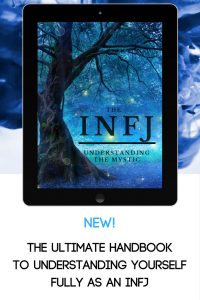

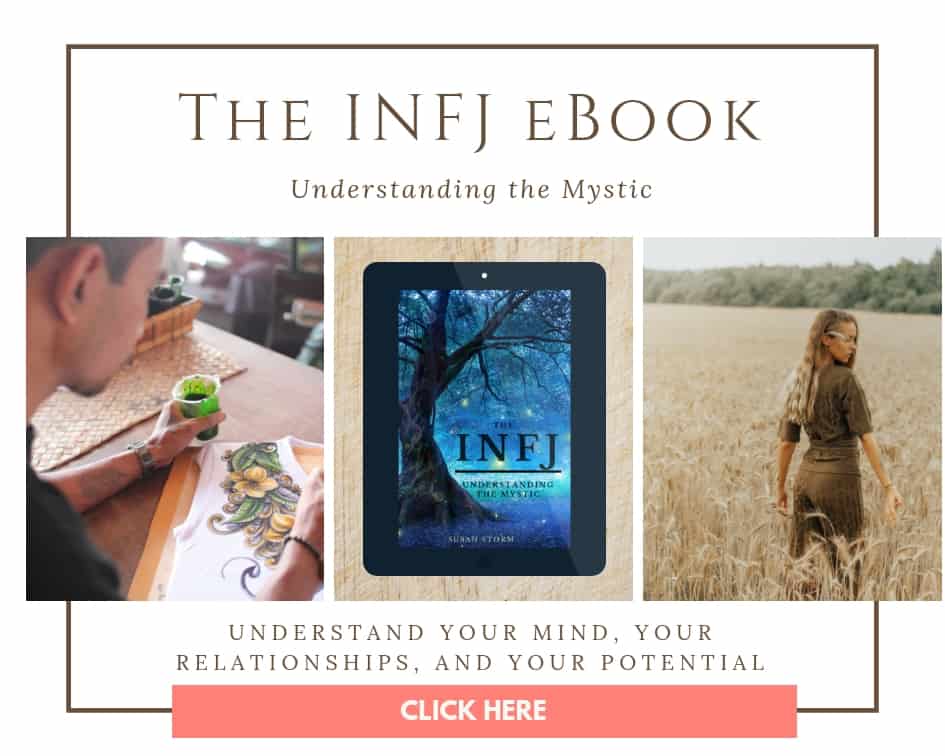



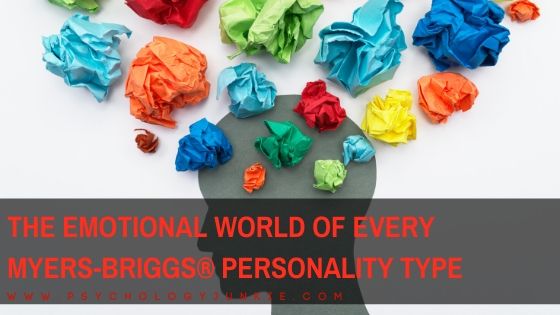






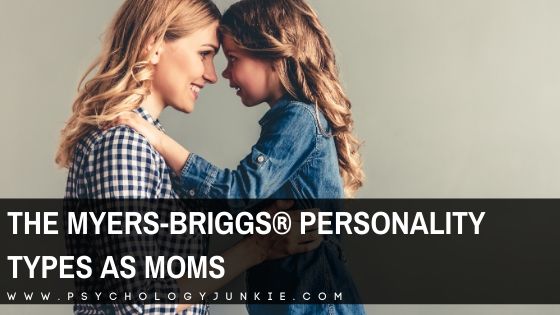
That is a very accurate description. It can be frustrating to be an INFJ sometimes. All the wonderful thoughts, information, and insights seem so important to me, yet others just blow them off and tell me I’m being too analytical. It is like they are looking at the world in black and white and not seeing all the vivid and beautiful colors.
Susan D.
I completely agree with you! It’s very hard when we see a clue, can tell it’s leading to somewhere specific, try to talk about it either as a warning or encouragement and it’s blown off as having no basis in “reality”. I think since INFJs make up such a small percentage of the population it’s a bit easier for us to end up in situations where we are misunderstood or our strengths aren’t recognized.
It’s true. I often get frustrated when people simply sweep my concerns or suggestions aside because they could not understand my analogies. After that when my insights are proven they would engage me again but I would no longer be interested to pursue the matters.
Now I should write something to praise ur wisdom but u censored all messages, u dont like, so I write nothing, u lil bitch.
Hi Gizmo! I’m very confused. I haven’t censored any messages, in fact I don’t think it’s possible for me to change or edit other people’s comments on wordpress. I’m not sure what the problem is – but I’m willing to listen if you’d like to explain it.
This is very well written. I agree that it is not easy being an INFJ. There are many things we see that others don’t. We feel so deeply and are able to grasp hidden meaning and possibilities. But after all, I love being unique.
Thank you Teera for reading and sharing your perspective! It can be very isolating to be an INFJ, but I agree with you, that I wouldn’t change it 🙂
Nice article.
Thank you!! Glad you enjoyed it 🙂
Any thoughts on being able to articulate a foreseen outcome? I often call it out and get the pish posh, only to be able to say I told you so later after being ignored.
Hi Susan! Do you believe someone can start out with a different personality type as a teenager but life’s journey and experience change you as you get older and therefore your changes your personality type as well?
I constantly get “hunches” about people and people always look at me like I’m crazy. I once told a friend at school that there was something wrong with the guy she was dating and it was a bad idea, but I didn’t really even know him so she got mad at me for telling her not to date him. He just rubbed me the wrong way. About a month later, he was expelled from our school and my friend revealed all the issues he had. This is just one instance. I get hunches about people ALL the time, like daily. Growing up, I was constantly told that “judging people” was wrong and whatever I felt about people initially was something to be shamefull about, especially since I could never come up with reasons why I thought people were paricularly good or bad. Even when I was little, I felt extremely guilty about it because I thought I was judging and assuming things that may not be true. When I found out I was an INFJ, it helped me to umderstand myself. This blog really helped too! It’s good to know I am not doing something wrong (assuming, judging) when a person or circumstance rubs me a certain way, and that I might actually be right!
I have this condition. I find it both a blessing and a curse. Mine of course was further enhanced due to abuse and I developed it to a fine honed edge by intensely watching people’s body language and voice inflections so I would know when and if I should escape a situation to protect myself from more harm. It got so bad, so intense that I had to force myself to stop to a degree because I was isolating myself so I wouldn’t have to see scorn or a ridiculing face when someone looked my way. I’ve used it purely for self defense. People have even told me that I made them nervous because of my quietness and watchful nature! Imagine that! ?
Loved this article. I feel I am an infj as I fit nearly all the attributes but I have a problem with over analyzing which causes me to often doubt my intuitions which according to what I have read I should trust way more. I’m often unsure of almost every decision I make that may just be the people pleasing aspect of this type but it causes me a lot of suffereing as I can’t seem to get out of my own way
Someone finally said social work!